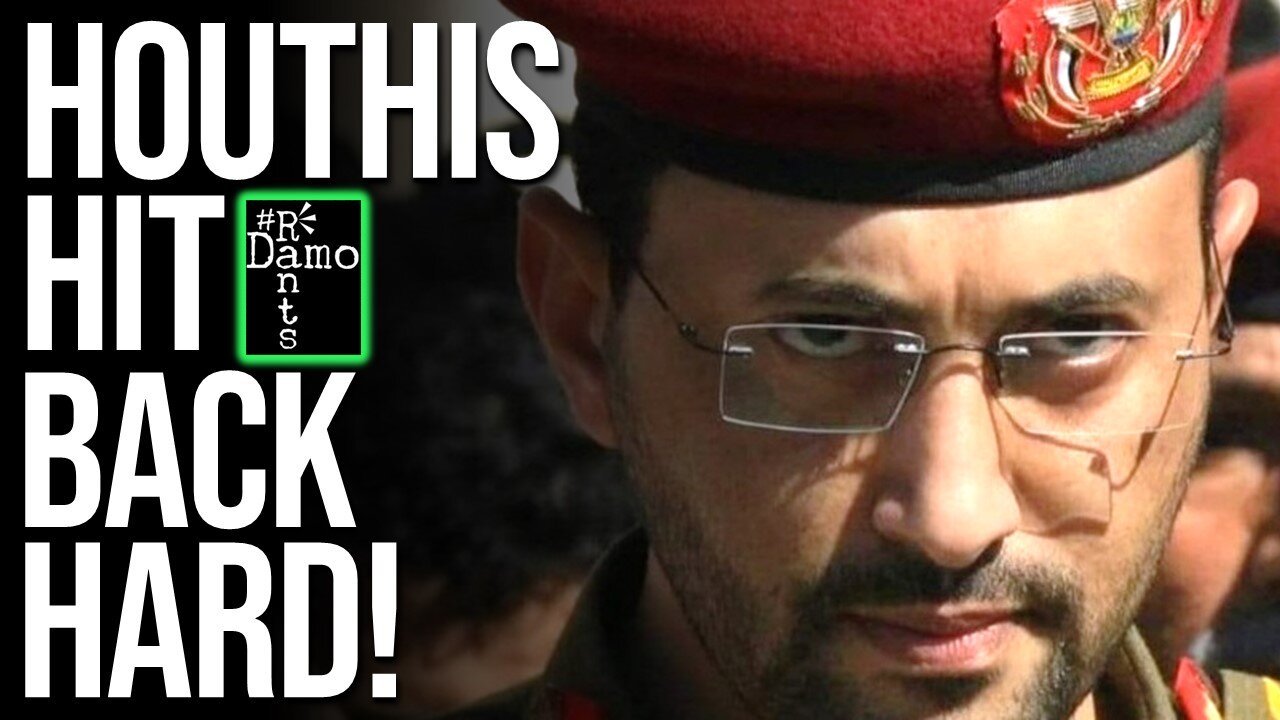Premium Only Content

Have The Houthis Just Sunk ANOTHER Ship in the Red Sea?
Right, so on the morning of July 6, the crew of the Magic Seas bulk carrier made a desperate Mayday call. Their ship, adrift in the Red Sea and ablaze after a multipronged assault involving missiles, small arms, and explosive-laden drone boats, had become the latest casualty in a widening war instigated by Israel following its invasion and subsequent ongoing genocide in Gaza. The attackers are a familiar bunch to us now, or at least are if you’re a regular viewer of this channel, because it was of course Yemen’s Houthis—the Magic Seas having apparently chanced its arm in running the Houthi blockade of pro Israel shipping and may now end up on the bottom of the sea as a result.
Once dismissed as a small and insignificant rebellion, the Houthis have become a legendary regional force in taking on Israel in defence of the people of Gaza. Having somewhat gone back to basics in this latest attack, the Houthis have expanded far beyond just the Red Sea in recent months, with their missile launches on Tel Aviv and Ben Gurion Airport, combined with their precision maritime disruptions, signalling that Gaza’s war has leapt beyond its borders and despite retaliatory attacks on Yemen, they just keep on coming and will keep on coming until Israel finally gets the message and gets out of Gaza.
Right, so the Houthis—more properly known as Ansar Allah of course—have consistently framed their military operations as direct responses to Israel’s actions in Gaza. Since the outbreak of Israel’s war on Gaza in October 2023, the group has declared itself part of a regional resistance alliance against the Zionist aggression, against their genocide of Gaza. Their leaders have stated unequivocally that attacks on Israeli territory and commercial interests will continue until Israel ends its military campaign in Gaza and lifts its blockade and they’ve backed their words up with actions.
And despite Israel launching attacks on Yemen as a result of Houthis attacks, now on their own in doing so as the US gave up, the populus of yemen, despite being the poorest Arab nation going, support the Houthis in significant numbers. For instance the Houthis have organized massive “million-man” rallies across Yemen, the latest one of these, as covered by Press TV, took place just last Friday, in which participants expressed their solidarity with Gaza and endorsed the group’s ongoing attacks on Israel. These public demonstrations underscore the domestic legitimacy the Houthis derive from their anti-Israel stance. More than a tactical move, their Red Sea campaign is a deeply ideological project that allows them to position themselves as defenders of the Palestinian cause, resonating with regional audiences that are increasingly disillusioned with Western and Arab regimes' silence and complicity.
According to the Marine Corps University Journal (JAMS), the Houthis’ Red Sea operations are a form of "calibrated escalation," designed to secure influence without triggering direct confrontation with overwhelming Western or Israeli military responses.
The Houthis have rapidly evolved from guerrilla insurgents in dinghies into a sophisticated military force capable of launching long-range missile strikes, drone attacks, and maritime ambushes.
For example, on July 1, a hypersonic missile launched by the Houthis targeted Israel’s Ben Gurion Airport, according to Press TV and confirmed by subsequent Israeli disruptions to commercial flights.
Earlier missile incidents include a June 15 strike, reportedly coordinated with Iranian intelligence, and a July 6 barrage that triggered missile defence systems across southern Israel. Although most of these projectiles were allegedly intercepted, their psychological and political impact remains significant – as the Houthis often say, their objectives were achieved. Israel ends up being forced to suspend flights out of Tel Aviv, Israelis, often in the middle of the night are sent from their beds to shelters, underscoring Israel’s vulnerability to air strikes, made abundantly clear by the strikes launched by Iran in retaliation for the unprovoked assault Israel launched on them last month.
Maritime attacks, however, have been the Houthis' most effective domain. Since November 2023, when they first decided to intervene in Israel’s atrocities on Gaza, their campaign in the Red Sea has damaged or sunk multiple ships. The July 6 attack on the Magic Seas, a Liberian-flagged, Greek-operated bulk carrier, is the latest, though in truth we haven’t seen much by way of maritime strikes on Israeli shipping by the Houthis for some time, mot shipping companies choosing not to risk it. This vessel had clearly decided otherwise. The crew abandoned ship after being assaulted by small arms, RPGs, and unmanned surface drones as covered by Straight Arrow News and GCaptain, with Reuters later reported that the vessel was left burning and may ultimately sink.
By disrupting commercial shipping routes that indirectly benefit Israel, the Houthis aim to pressure international stakeholders to act against Israel’s military campaign, as well as deny Israel essential goods, reliant on sea trade as Israel is. The International Crisis Group has documented how these maritime operations undermine global confidence in Red Sea transit, forcing major carriers to reroute or suspend operations entirely. This has allowed the Houthis to inflict disproportionate damage at minimal cost.
In response to the July 6 missile attacks and the damage and potential sinking of the Magic Seas, Israel launched a major air campaign overnight. Codenamed Operation Flag (Black), the assault involved around 20 fighter jets and targeted key Houthi infrastructure, including the ports at Hodeidah, Ras Isa, and Salif – civilian areas yet again, since Israel don’t know where the Houthis actually are - as well as the Ras Qantib power plant and the moored Galaxy Leader, a ship seized by the Houthis in 2023.
While Israeli officials framed the strikes as retaliatory and "surgical," reporting by Al Jazeera and Press TV, paints a different picture. The strikes caused extensive damage to civilian infrastructure and power grids, disrupting electricity for hundreds of thousands. The Galaxy Leader was reportedly being used as a floating radar surveillance post, though this claim has not been independently verified. It is indiscriminate bombing by Israel as has been typical of all of their assaults.
Yet despite all of that the Houthis keep coming and won’t be shut down. The transformation of the Red Sea into a conflict zone has vast global implications. The Bab el-Mandeb Strait—a chokepoint through which roughly 10% of global maritime trade passes—is now a battleground.
Shipping giants like Maersk, CMA CGM, and MSC have rerouted their fleets around the Cape of Good Hope, significantly increasing journey times and operational costs. Insurance premiums for Red Sea transits have surged. This risk has led to a steep decline in Red Sea commercial activity, to the point the southern Israeli port of Eilat is now basically bankrupt.
The July 6 attack on the Magic Seas demonstrated that forces like the Houthis remain effective in the Red Sea and undeterred by attacks on them. The US gave up and went home after all, so what affect Israel thinks it can make no matter what they do is anyone’s guess and of course the optics of why the Houthis are doing what they are doing speak very much for themselves.
Western intelligence assessments suggest that while Iran provides financial, technological, and ideological support to the Houthis, the group retains operational independence these days. It has been emphasised that the Houthis function less as traditional proxies and more as strategic partners within the so-called Axis of Resistance. This distinction is crucial: it allows Iran to support escalations without assuming direct responsibility, its also why many western media outlets disingenuously still refer to the Houthis as Iranian proxies – to promote a narrative rather than tell the truth.
Moreover, this flexible structure enhances the Houthis’ image as autonomous defenders of Palestinian rights rather than mere Iranian pawns. Their popular base in Yemen—as evidenced by these mass rallies that seemingly take place on a weekly basis—views their role in the Gaza conflict as morally justified and strategically necessary.
The events concerning the Magic Seas makes clear that Gaza’s war has become a regional conflagration, where when everything seems to be going Israel’s way in Gaza, the Strip is not without allies prepared to step up and do something about that. The Houthis have successfully opened a southern front against Israel, leveraging maritime disruption and missile strikes to amplify the costs of continued aggression and there is nothing that Israel can do it seems to stop them. Nevertheless, Israel’s response—a sweeping bombing campaign across Yemen—has happened repeatedly anyway, but each time failed to deter further attacks and may have instead fuelled a broader escalation as well as exposed them even more to the rest of the world for their ongoing depravity the only reason they attack Yemen after all, is because they won’t stop committing a literal genocide in Gaza.
The Red Sea is no longer a commercial corridor for Israel and if they needed a reminder of that, the Magic Seas was it. They won’t learn from it though. They will keep attacking, keep razing Gaza, keep seizing territory, keep responding to Houthi strikes with more attacks, because war in Netanyahu’s eyes is all that is keeping him in power, but the Houthis won’t stop either, doing what they view as the morally right thing to do at every turn.
Of course the one thing all of this is adding up to is a very big bill for Israel’s ailing economy, but with the US taxpayer bailing them out all the time, I’m sure they’ll be fine – yet Israel is losing money elsewhere than on the battlefield and the US taxpayer might not be able to stump up the billions and billions Israel are losing off the battlefield as well. Get all the details of that story in this video recommendation here as your suggested next watch.
Please do also hit like, share and subscribe if you haven’t done so already so as to ensure you don’t miss out on all new daily content as well as spreading the word and helping to support the channel at the same time which is very much appreciated, holding power to account for ordinary working class people and I will hopefully catch you on the next vid. Cheers folks.
-
 LIVE
LIVE
Wayne Allyn Root | WAR Zone
5 hours agoWAR Zone LIVE | 19 SEPTEMBER 2025
182 watching -
 1:11:12
1:11:12
vivafrei
5 hours agoRaja Jackson finally charged! Ostrich cull immune! Dems degeneracy continues in & more!
124K49 -
 15:40
15:40
Robbi On The Record
1 day agoThe Truth About Your Fitness Tracker
7.44K6 -
 DVR
DVR
The White House
3 hours agoPresident Trump Signs Executive Orders, Sep. 19, 2025
18.7K9 -
 LIVE
LIVE
LFA TV
19 hours agoBREAKING NEWS ON LFA TV! | FRIDAY 9/19/25
1,175 watching -
 14:37
14:37
Bearing
10 hours agoHasan Piker on Charlie Kirk’s “Dangerous Ideas” 💥 Just a LARPER Bro 😂
4.54K31 -
 1:31:13
1:31:13
The Quartering
5 hours agoColbert Rages Over Kimmel, Antifa Attacks Charlie Kirk Vigil & Raja Jackson Arrested Finally
177K67 -
![MAHA News [9.19] McDonalds & Tyson Get Healthier, Big Pharma Ads, CDC Updates Vax Sched](https://1a-1791.com/video/fww1/5d/s8/1/4/u/s/j/4usjz.0kob-small-MAHA-News-9.19.jpg) 1:11:08
1:11:08
Badlands Media
14 hours agoMAHA News [9.19] McDonalds & Tyson Get Healthier, Big Pharma Ads, CDC Updates Vax Sched
21.8K3 -
 1:04:41
1:04:41
Ben Shapiro
5 hours agoEp. 2284 - THE DAY AFTER: Kimmel Suspended, Democrats LIVID
64.5K77 -
 1:57:22
1:57:22
The Charlie Kirk Show
6 hours agoTucker Carlson on the Faith of Charlie Kirk | 9.19.2025
178K144